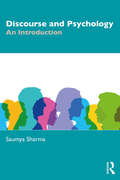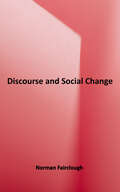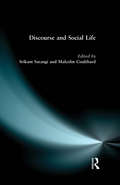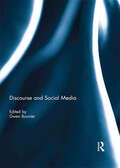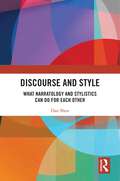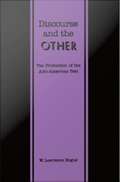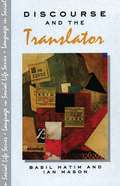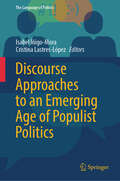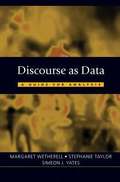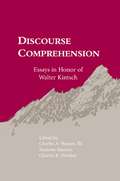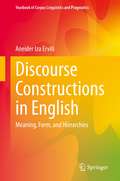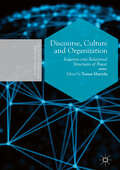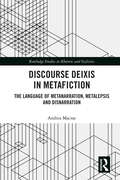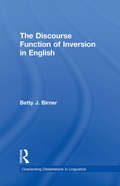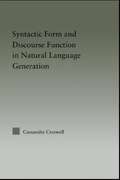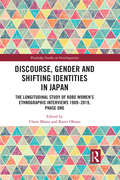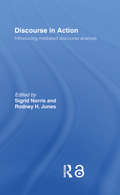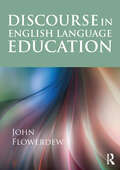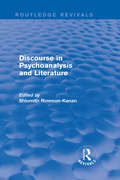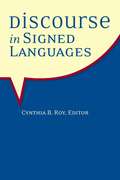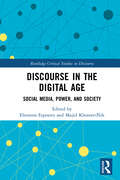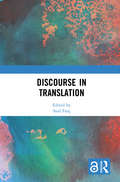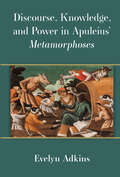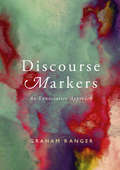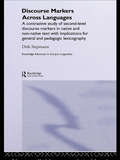- Table View
- List View
Discourse and Psychology: An Introduction
by Saumya SharmaThis book presents a unique understanding of the interdependence between language and psychology and how one’s speech is shaped by and in turn shapes one’s thoughts, beliefs, and emotions. Drawing on the tenets of discourse analysis and psychology, it presents a comprehensive guide to a new and burgeoning area in linguistics and critical theory. The volume focusses on individual and group behaviour to show how identity formation is as much dependent on the psychological state as on social surroundings and context. It introduces various concepts from the sociocognitive framework, discursive and critical psychology, highlighting the myriad ways of approaching the complex interface between text, sociocultural factors, and cognitive processes. An indispensable guide to the complex world of language and the unconscious, the volume will be of interest to students and scholars of linguistics, applied linguistics, sociolinguistics, psychology and behavioural science, language, and critical theory. It is also a must-read for the general reader interested in language, communication, and social intelligence.
Discourse and Social Change
by Norman FaircloughThis book is a critical introduction to discourse analysis as it is practiced in a variety of different disciplines today, from linguistics and sociolinguistics to sociology and cultural studies. The author shows how concern with the analysis of discourse can be combined, in a systematic and fruitful way, with an interest in broader problems of social analysis and social change. Fairclough provides a concise and critical review of the methods and results of discourse analysis, discussing the descriptive work of linguists and conversation analysts as well as the more historically and theoretically oriented work of Michel Foucault. He develops an original framework for discourse analysis which firmly situates discourse in a broader context of social relations bringing together text analysis, the analysis of processes of text production and interpretation, and the social analysis of discourse events.
Discourse and Social Life
by Srikant Sarangi Malcolm CoulthardThis collection brings together for the first time in a single volume many of the major figures in contemporary discourse studies. Each chapter is an original contribution which has been specifically commissioned for this book, and together they document the wide range of concerns and techniques which characterise the discipline at the turn of the century.Discourse and Social Life is concerned with a variety of different types of data - talk, text and interaction - and covers research sites which range from the home setting through the health care setting and the courtroom to the public sphere. The book not only provides a critical, historical overview of different traditions of discourse analysis, but also projects to some extent the possible developments of this field of study, as other allied disciplines (Philosophy, Psychology, Sociology, Rhetoric and Communication Studies) are taking a discursive turn. Readers are invited to draw parallels between these different approaches to studying discourse in its social context. The contributors are- Sally Candlin, Malcolm Coulthard, Justine Coupland, Nikolas Coupland, Norman Fairclough, Ruqaiya Hasan, Robert Kaplan, Geoff Leech, Yon Maley, Greg Myers, Celia Roberts, Srikant Sarangi, Ron Scollon, Theo van Leeuwen, Henry Widdowson and Ruth Wodak.
Discourse and Social Media
by Gwen BouvierDiscourse and Social Media is a unique and timely collection that breaks ground on how discourse scholars, coming from a range of disciplinary perspectives, can critically analyse different social media, including YouTube, Facebook, Twitter, and News. The book fills a gap in the market for a multi-disciplinary collection for analysing the discourse of social media. In providing a thorough review of the field to date, the opening chapter considers some of the common and divergent interests and priorities that exist in social media discourse analysis. It also discusses the wider methodological and theoretical implications which social media analysis brings to the process of discourse analysis, as new forms of connections and communication call us to re-think the static models that we have been using. The rest of the collection draws on different traditions in discourse studies, including Critical Discourse Analysis, Sociolinguistics, Pragmatics, Foucaultian analysis and Multimodality, to bring several unique approaches to critically analysing social media from a discourse perspective. Each ground-breaking chapter shows how different forms of social media data can best be selected, analysed, and dealt with critically. As a whole, Discourse and Social Media provides a go-to resource for social media scholars, as well as graduate students. The book is a significant contribution to the development of the field at this present shifting time. This book was originally published as a special issue of the Journal of Multicultural Discourses.
Discourse and Style: What Narratology and Stylistics Can Do for Each Other
by Dan ShenThis book examines overlaps, differences, and complementarities between narratology and stylistics, and shows the consequences of this examination for the practical analysis of prose narrative.Narratology identifies discourse as one of its two main objects of study (story being the other), and stylistics, of course, designates style as its concern. Too often, however, work in each of these fields proceeds without attention to developments in the other. This book corrects that situation by looking beneath the superficial similarities between the “discourse” of narratology and the “style” of fictional stylistics. The author shows that the two seemingly interchangeable terms actually refer to different textual elements. For example, both narratology and stylistics identify point of view as an important element of discourse and style, respectively, but each approach conceives of it differently and thus analyzes it differently. This book argues that the different analyses are complementary and shows how they can be brought together. This synthesis leads to richer conceptions of point of view as well as more comprehensive and precise analyses of its functions and effects in individual narratives.For its theoretical and interpretive contributions, this book will appeal to scholars and students in narrative studies, literary stylistics, and literary theory and criticism.
Discourse and the Other: The Production of the Afro-American Text
by W. Lawrence HogueThe central thesis of Lawrence Hogue's book is that criticism of Afro-American literature has left out of account the way in which ideological pressures dictate the canon. This fresh approach to the study of the social, ideological, and political dynamics of the Afro-American literary text in the twentieth century, based on the Foucauldian concept of literature as social institution, examines the universalization that power effects, how literary texts are appropriated to meet ideological concerns and needs, and the continued oppression of dissenting voices. Hogue presents an illuminating discussion of the publication and review history of "major" and neglected texts. He illustrates the acceptance of texts as exotica, as sociological documents, or as carriers of sufficient literary conventions to receive approbation. Although the sixties movement allowed the text to move to the periphery of the dominant ideology, providing some new myths about the Afro-American historical past, this marginal position was subsequently sabotaged, co-opted, or appropriated (Afros became a fad; presidents gave the soul handshake; the hip-talking black was dressing one style and talking another. ) This study includes extended discussion of four works; Ernest J. Gaines's The Autobiography of Miss Jane Pittman, Alice Walker's The Third Life of Grange Copeland, Albert Murray's Train Whistle Guitar, and Toni Morrison's Sula. Hogue assesses the informing worldviews of each and the extent and nature of their acceptance by the dominant American cultural apparatus.
Discourse and the Translator (Language In Social Life)
by B. Hatim Ian MasonDiscourse and the Translator both incorporates and moves beyond previous studies of translation. Its logical and informative approach to the problems of translation ensures that it will be essential for all those who work with languages 'in contact'. Incorporating research in sociolinguistics, discourse studies, pragmatics and semiotics, the authors analyse the process and product of translation in their social contexts. Through this analysis, the book emphasises the importance of the translator as a mediator between cultures.
Discourse Approaches to an Emerging Age of Populist Politics (The Language of Politics)
by Isabel Íñigo-Mora Cristina Lastres-LópezThis book presents a collection of studies related to populism in contemporary political discourse. Following growing scholarly interest in the topic, this volume offers a wide panorama on the discursive construction of populism across the political spectrum worldwide. International experts from different backgrounds provide a comprehensive analysis of populist communication in present-day politics. Each chapter in the book constitutes a case study from a different country, altogether offering a global perspective on the construction of populism in political discourse. In particular, the book presents studies from fourteen different countries across the globe: Belgium, France, Spain, the United States of America, Portugal, Montenegro, Italy, Ghana, the United Kingdom, Turkey, Japan, Russia, Poland, and Israel. Here, readers can (1) get acquainted with discourse on populism in the media; (2) have access to ample descriptions of populist communication strategies across frontiers; (3)explore populist discourse by contemporary societies’ well-known political leaders from different countries; and (4) examine the intertwining of populism, policymaking, and religion. Rooted in different frameworks, the various chapters offer a comprehensive understanding of the complex phenomenon of populism. The volume also enables the reader to globally grasp similarities and differences in the way populist discourse is built from West to East. International and interdisciplinary approaches form the cornerstone of this volume that will appeal to scholars from diverse academic backgrounds.
Discourse As Data: A Guide For Analysis (Published In Association With The Open University Series)
by Simeon J. Yates Stephanie Taylor Margaret WetherellThis workbook will be invaluable for students across the social sciences who need to learn how to analyze discourse. Using a step-by-step approach, students are introduced to the principal range of methods for analyzing different types of text, taken through key analytic concepts, offered specimen analyses and given the opportunity to try out analytic concepts on new data. Discourse as Data is organized around eight chapters, six of which are related to the domains covered in the Reader, and top and tailed by two chapters which set up common methodological issues in discourse research relevant to all approaches (such as transcription and the application and the critical evaluation of discourse research).
Discourse Comprehension: Essays in Honor of Walter Kintsch
by Charles A. Weaver Suzanne Mannes Charles R. FletcherThis volume is derived from presentations given at a conference hosted in Boulder, Colorado in honor of the 60th birthday of Walter Kintsch. Though the contents of the talks, and thus the chapters, varied widely, all had one thing in common -- they were inspired to some degree by the work of Walter Kintsch. When making plans for an edited book centered around this conference, the editors had a primary goal: to acknowledge the wide variety of researchers and research areas Kintsch had influenced. As a consequence, one of the more unusual elements of this volume is the diversity of the contributors. Researchers from six different countries contributed chapters to this book which is loosely organized around three main thrusts of Kintsch's work: * text-based representations that explain how meaning in a text is constructed, * situation models which represent what the text is about rather than what a text literally says, and * the construction-integration model, Kintsch's most recent work in discourse comprehension.
Discourse Constructions in English: Meaning, Form, and Hierarchies (Yearbook of Corpus Linguistics and Pragmatics)
by Aneider Iza ErvitiThis book emphasizes the advantages of examining discourse connectivity from a constructionist perspective and highlights the role of discourse configurations in the construction of meaning. The research contained advances the field of cognitive classification and categorization of discourse constructions. The text is a great improvement in the discourse analysis literature, since it uniquely clarifies the subtleties of meaning between different discourse markers that are frequently treated as equivalent by lexicographers. It is unique in being the first contribution to the creation of a Constructicon at the discourse level and it fills an important gap within cognitively oriented constructionist accounts that have mostly restricted their analyses to argument-structure and illocutionary constructions. This yearbook appeals to students and researchers working within corpus linguistics.
Discourse, Culture and Organization: Inquiries Into Relational Structures Of Power (Postdisciplinary Studies in Discourse)
by Tomas MarttilaThis edited volume brings together leading international researchers from across the social sciences to examine the theoretical premises, methodological options and critical potentials of the Essex School of discourse analysis, founded on the work of Ernesto Laclau and Chantal Mouffe. In doing so, it presents a clear picture of a poststructuralist and post-foundational research program to postdisciplinary discourse research. Divided into three parts, it begins by elaborating the ontological, theoretical and methodological foundations of the Essex School’s approach to discourse analysis. The second part provides empirical case studies showing how the Essex School research program informs and instructs empirical discourse research. In the concluding third part authors explain how and with what possible consequences this strand of discourse research contributes to social practices of critique. It offers a crucial contribution to the further methodologization and operationalization of the Essex School’s approach so as to make it a viable alternative to discourse-analytical approaches that take dominant positions in today’s ‘field of discourse studies’. The book's transdisciplinary focus will attract readers who use discourse analysis in all areas of the social sciences and humanities, particularly applied linguistics, cultural anthropology, sociology, philosophy and history.
Discourse Deixis in Metafiction: The Language of Metanarration, Metalepsis and Disnarration (Routledge Studies in Rhetoric and Stylistics)
by Andrea MacraeThis volume advances scholarly understanding of the ways in which discourse deixis underpins the workings of metafictional novels. Building on existing scholarship in the field, the book begins by mapping out key themes and techniques in metafiction and puts forward a focused and theoretically coherent account of discourse deixis—language which points to a section or aspect of the discourse context in which that language is used—in written literary discourse, highlighting its inherent significance in metafiction specifically. Macrae takes readers through an exploration of discourse deixis as used within the techniques of metanarration, metalepsis, and disnarration, drawing on a mix of both well-established and lesser-known metafictional novels from the late 1960s and early 1970s by such authors as John Barth, Brigid Brophy, Robert Coover, John Fowles, Steve Katz, and B.S. Johnson. This comprehensive account integrates and develops a new approach to understanding discourse deixis and innovative insights into metafictionality more broadly and will be of particular interest to scholars in literary studies, postmodern literature, narratology, and stylistics.
The Discourse Function of Inversion in English (Outstanding Dissertations in Linguistics)
by Betty BirnerFirst published in 1997. Routledge is an imprint of Taylor & Francis, an informa company.
Discourse Function & Syntactic Form in Natural Language Generation (Outstanding Dissertations in Linguistics)
by Cassandre CreswellUsers of natural languages have many word orders with which to encode the same truth-conditional meaning. They choose contextually appropriate strings from these many ways with little conscious effort and with effective communicative results. Previous computational models of when English speakers produce non-canonical word orders, like topicalization, left-dislocation and clefts, fail. The primary goal of this book is to present a better model of when speakers choose to produce certain non-canonical word orders by incorporating the effects of discourse context and speaker goals on syntactic choice. This book makes extensive use of previously unexamined naturally occurring corpus data of non-canonical word order in English, both to illustrate the points of the theoretical model and to train the statistical model.
Discourse, Gender and Shifting Identities in Japan: The Longitudinal Study of Kobe Women’s Ethnographic Interviews 1989-2019, Phase One (Routledge Studies in Sociolinguistics)
by Claire Maree Kaori OkanoThis book is the first in a unique series drawn from an interdisciplinary, longitudinal project entitled ‘Thirty Years of Talk.’ For 30 years, Okano recorded ethnographic interviews and collected data on the language of working class women in Kobe, Japan. This long-range study sketches the transitions in these women's lives and how their language use, discourse and identities change in specific sociocultural contexts as they shift through different stages of their personal and public lives. It is a ground-breaking, ‘real time’ panel study that follows the same individuals and observes the same phenomena at regular intervals over three decades. In this volume the authors examine the changes in the speech of one particular woman, Kanako, as her social identity shifts from high-school girl to mother and fisherman’s wife, and as her relationship with the interviewer develops. They identify changes in linguistic strategies as she negotiates gender/sexuality norms, stylistic features related to the construction of rapport, the use of discourse markers as she gets older, and the interviewer’s information-seeking strategies.
Discourse in Action: Introducing Mediated Discourse Analysis
by Rodney H Jones Sigrid NorrisFrom emails relating to adoption over the Internet to discussions in the airline cockpit, the spoken or written texts we produce can have significant social consequences. The area of Mediated Discourse Analysis considers texts in their social and cultural contexts to explore the actions individuals take with texts - and the consequences of those actions. Discourse in Action: brings together leading scholars from around the world in the area of Mediated Discourse Analysis reveals ways in which its theory and methodology can be used in research into contemporary social situations explores real situations and draws on real data in each chapter shows how analysis of texts in their social contexts broadens our understanding of the real world.Taken together, the chapters provide a comprehensive overview to the field and present a range of current studies that address some of the most important questions facing students and researchers in linguistics, education, communication studies and other fields.
Discourse in English Language Education
by John FlowerdewDiscourse in English Language Education introduces students to the major concepts and questions in Discourse Studies and their applications to language education. Each chapter draws on key research to examine critically a particular approach in the field, providing a review of important literature, examples to illustrate the principal issues concerned and an outline of the implications for their application to pedagogy. Features include: coverage of a broad range of approaches in the field, including Systemic Functional Linguistics and Register, Speech Acts, the Cooperative Principle and Politeness, Conversation Analysis, Genre Analysis, Critical Discourse Analysis and Corpus Linguistics analysis of a wide range of discourse examples that include casual conversation, newspapers, fiction, radio, classrooms, blogs and real-life learner texts a selection of illustrations and tables carefully chosen to enhance students' understanding of different concepts and approaches stimulating discussion questions at the end of each chapter, specially designed to foster critical thinking, reflection and engagement with the topics covered. Engaging, accessible and comprehensive, Discourse in English Language Education richly demonstrates how Discourse Studies can inform the teaching of English and other languages, both as a foreign language and in the mother tongue. It will be essential reading for upper undergraduates and postgraduates with interests in Applied Linguistics, TESOL and Language Education.
Discourse in Psychoanalysis and Literature (Routledge Revivals)
by Shlomith Rimmon-KenanThe essays in this collection, first published in 1987, represent a collective attempt to listen with the third ear to the underhand ways the unspoken has of speaking, and to speak of these ways. By focusing on ‘discourse’ the volume is distinguished from traditional literature by its emphasis on rhetorical structures and textual strategies, and the investment of these structures with desire, power and other aspects of subjectivity, rather than the personality of the artist or the creative process. However, in this book the human dimension is not lost. By claiming that the structures in question are not merely linguistic, semiotic, or narratological (although they are all of these), the human dimension is returned- not ‘in the raw’, as in traditional approaches, but through the traces it leaves in the text, as activated by its reading. This book is ideal for students of literature and psychoanalytical theory.
Discourse in Signed Languages
by Cynthia B. RoyIn this volume, editor Cynthia B. Roy presents a stellar cast of cognitive linguists, sociolinguists, and discourse analysts to discover and demonstrate how sign language users make sense of what is going on within their social and cultural contexts in face-to-face interactions. In the first chapter, Paul Dudis presents an innovative perspective on depiction in discourse. Mary Thumann follows with her observations on constructed dialogue and constructed action. Jack Hoza delineates the discourse and politeness functions of hey and well in ASL as examples of discourse markers in the third chapter. Laurie Swabey investigates reference in ASL discourse in the fourth chapter. In Chapter 5, Christopher Stone offers insights on register related to genre in British Sign Language discourse, and Daniel Roush addresses in Chapter 6 the "conduit" metaphor in English and ASL. Jeffrey Davis completes this collection by mapping out the nature of discourse in Plains Indian Sign Language, a previously unstudied language. The major thread that ties together the work of these varying linguists is their common focus on the forms and functions of sign languages used by people in actual situations. They each provide new keys to answering how thoughts expressed in one setting with one term or one utterance may mean something totally different when expressed in a different setting with different participants and different purposes.
Discourse in the Digital Age: Social Media, Power, and Society (Routledge Critical Studies in Discourse)
by Eleonora Esposito Majid KhosraviNikThis collection makes the case for existing critical discourse analysis theory and methods to meaningfully engage with the communicative parameters, power dynamics, and technological affordances of contemporary digital spaces. This book lends a critical focus on discursive practices operating through the paradigm of social media communication, addressing the crucial interface of discourse and the participatory web with disciplinary rigour and a well-balanced focus. This volume features chapters highlighting a diverse range of methods, including multi-sited ethnography, multimodality, argumentation studies, and topic modelling, as applied to a global range of case studies to present a holistic portrait of the latest methodological and theoretical debates in this space. The collection demonstrates the many and pervasive impacts of digital mediation on established discursive practices that are (re-)shaping existing social values, practices, and demands. In so doing, the collection advocates for a new tradition in critical discourse research, one which is rigorous in accounting for both solid discursive frameworks and the evolving complexity of digital platforms, and which triangulates methodologies in order to fully make sense of contemporary discursive practices and power relations on the online–offline continuum. This collection will be of interest to students and scholars in critical discourse studies, digital communication, media studies, and anthropology.
Discourse in Translation (Routledge Studies In Language And Identity Ser.)
by Said FaiqThis book explores the discourse in and of translation within and across cultures and languages. From the macro aspects of translation as an inter- cultural project to actual analysis of textual ingredients that contribute to translation and interpreting as discourse, the ten chapters represent different explorations of ‘global’ theories of discourse and translation. Offering interrogations of theories and practices within different sociocultural environments and traditions (Eastern and Western), Discourse in Translation considers a plethora of domains, including historiography, ethics, technical and legal discourse, subtitling, and the politics of media translation as representation. This is key reading for all those working on translation and discourse within translation studies and linguistics.
Discourse, Knowledge, and Power in Apuleius’ Metamorphoses
by Evelyn AdkinsIn ancient Rome, where literacy was limited and speech was the main medium used to communicate status and identity face-to-face in daily life, an education in rhetoric was a valuable form of cultural capital and a key signifier of elite male identity. To lose the ability to speak would have caused one to be viewed as no longer elite, no longer a man, and perhaps even no longer human. We see such a fantasy horror story played out in the Metamorphoses or The Golden Ass, written by Roman North African author, orator, and philosopher Apuleius of Madauros—the only novel in Latin to survive in its entirety from antiquity. In the novel’s first-person narrative as well as its famous inset tales such as the Tale of Cupid and Psyche, the Metamorphoses is invested in questions of power and powerlessness, truth and knowledge, and communication and interpretation within the pluralistic but hierarchical world of the High Roman Empire (ca. 100–200 CE). Discourse, Knowledge, and Power presents a new approach to the Metamorphoses: it is the first in-depth investigation of the use of speech and discourse as tools of characterization in Apuleius’ novel. It argues that discourse, broadly defined to include speech, silence, written text, and nonverbal communication, is the primary tool for negotiating identity, status, and power in the Metamorphoses. Although it takes as its starting point the role of discourse in the characterization of literary figures, it contends that the process we see in the Metamorphoses reflects the real world of the second century CE Roman Empire. Previous scholarship on Apuleius’ novel has read it as either a literary puzzle or a source-text for social, philosophical, or religious history. In contrast, this book uses a framework of discourse analysis, an umbrella term for various methods of studying the social political functions of discourse, to bring Latin literary studies into dialogue with Roman rhetoric, social and cultural history, religion, and philosophy as well as approaches to language and power from the fields of sociology, linguistics, and linguistic anthropology. Discourse, Knowledge, and Power argues that a fictional account of a man who becomes an animal has much to tell us not only about ancient Roman society and culture, but also about the dynamics of human and gendered communication, the anxieties of the privileged, and their implications for swiftly shifting configurations of status and power whether in the second or twenty-first centuries.
Discourse Markers: An Enunciative Approach
by Graham RangerIn our everyday speech we represent events and situations, but we also provide commentary on these representations, situating ourselves and others relative to what we have to say and situating what we say in larger contexts. The present volume examines this activity of discourse marking from an enunciative perspective, providing the first English-language study of the highly influential Theory of Enunciative and Predicative Operations. This semantic/pragmatic theory is popular among academics who specialize in linguistics, discourse analysis, translation studies and didactics in France, but has not yet been widely adopted elsewhere. The tools of this theory are applied to a variety of specific discourse markers in contemporary English and semantic hypotheses are tested using the data-based approach of corpus linguistics. This book therefore provides an English-speaking readership with the keys to understand the theory underlying the author’s analysis of a selection of markers (‘anyway’, ‘indeed’, ‘in fact’, ‘yet’, ‘still’, ‘like’ and 'I think'). This book will provide a valuable resource for students and researchers in linguistics with an interest in discourse markers, natural language argumentation, formal semantics, the interfaces between syntax, semantics and pragmatics, linguistic theorisation and French – or “poststructural” – models of discourse analysis.
Discourse Markers Across Languages: A Contrastive Study of Second-Level Discourse Markers in Native and Non-Native Text with Implications for General and Pedagogic Lexicography (Routledge Advances in Corpus Linguistics)
by Siepmann DirkThis book offers a corpus-based comparative study of an almost entirely unexplored set of multi-word lexical items serving pragmatic or text-structuring functions. Part One provides a descriptive account of multi-word discourse markers in written English, French and German, focussing on dicussion of interlingual equivalence. Part Two examines the use of multi-word markers by non-native speakers of English and discusses lexicographical and pedagogical implications.
